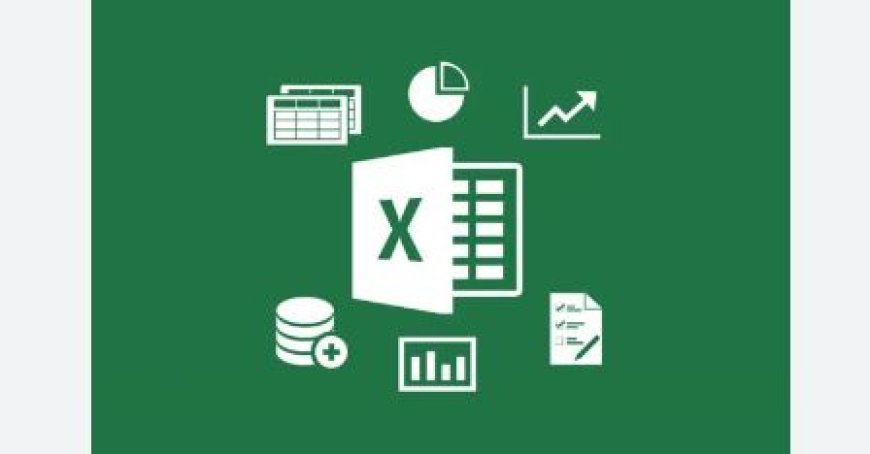How to Build a Successful Career with Excel Specialist Jobs
Excel specialist jobs offer great opportunities for individuals with strong analytical skills and a passion for working with data. Whether you're just starting or looking to advance your career as an Excel expert, there are plenty of ways to improve your skills and increase your chances of landing your dream job.

Excel is one of the most widely used tools in today's workplace. Whether you’re managing data, creating reports, or analyzing trends, proficiency in Excel can make a huge difference in your career. In this blog, we will explore Excel specialist jobs, what they entail, the skills you need, and how to advance as an Excel expert. Whether you are starting or looking to boost your career, this guide will provide insights to help you navigate through these rewarding roles.
What is an Excel Specialist Job?
An Excel specialist is someone who possesses advanced knowledge and expertise in Microsoft Excel. These professionals use Excel to create complex spreadsheets, analyze data, and automate tasks. Excel specialist jobs can be found across various industries, including finance, healthcare, marketing, and operations. The demand for these roles has been steadily increasing as businesses rely more on data-driven decisions.
In this role, individuals are expected to know more than just basic Excel functions. They should be capable of creating pivot tables, using advanced formulas, and building macros to streamline processes. Additionally, Excel specialists often collaborate with other departments to ensure data accuracy and generate reports that support business goals.
Skills Required for Excel Specialist Jobs
To succeed in an Excel specialist role, candidates need to have a combination of technical and analytical skills. Here are some of the most important skills for these positions:
Advanced Excel Functions
Excel is a powerful tool with many advanced features that can help professionals automate tasks and analyze large sets of data. Some key Excel functions that every specialist should know include:
- VLOOKUP: For searching and matching data in a spreadsheet.
- INDEX and MATCH: These are often used together to retrieve specific data points in larger data sets.
- IF Statements: Used to perform conditional logic and automate decisions.
- Pivot Tables: These allow users to summarize and analyze large datasets easily.
Data Analysis and Visualization
Excel specialists must be comfortable working with large datasets. They should have the skills to clean, analyze, and visualize data using charts and graphs. Knowing how to interpret trends and make data-driven recommendations is critical.
Macros and VBA
Excel experts often use Macros and Visual Basic for Applications (VBA) to automate repetitive tasks. Learning how to write and troubleshoot VBA code can help specialists streamline workflows and increase efficiency.
Attention to Detail
Data accuracy is crucial in Excel. Specialists must pay attention to detail to ensure that formulas, references, and data inputs are correct. Mistakes can lead to costly errors in analysis or reporting.
Communication Skills
While Excel specialists focus on technical tasks, they also need to communicate findings clearly to non-technical team members or executives. Explaining complex data insights in simple terms is a valuable skill.
The Role of an Excel Expert
While an Excel specialist is focused on the daily management and operation of Excel-related tasks, an Excel expert takes their skills to the next level. These professionals are often responsible for solving complex problems, designing advanced reporting systems, and providing guidance on best practices.
Excel experts are typically seen in more senior roles, and they may be involved in:
- Training teams: Sharing their knowledge with colleagues and helping them improve their Excel skills.
- Developing customized solutions: Designing complex spreadsheets or dashboards to meet the specific needs of the business.
- Data forecasting: Using Excel’s tools to predict trends, which is essential in fields like finance and marketing.
While an Excel specialist focuses more on execution, an Excel expert is often involved in strategy and decision-making at a higher level. The career progression from specialist to expert is a common path for many professionals.
How to Get an Excel Specialist Job
Securing an Excel specialist job requires a mix of technical know-how, practical experience, and the right certifications. Here’s how you can land such a role:
Gain Proficiency in Excel
The first step is to become highly skilled in Excel. If you're just starting, focus on learning the basics first. There are many online courses and tutorials available for free or for a reasonable cost. Once you master the basics, move on to more advanced functions like pivot tables, macros, and VBA.
Get Certified
While certifications aren’t always required, they can help set you apart from other candidates. The Microsoft Office Specialist (MOS) certification is a widely recognized credential for those who want to prove their Excel expertise. Many employers value certified candidates who have demonstrated their skills through official exams.
Build a Portfolio
Having a portfolio of your work can be a great way to show potential employers that you can handle Excel-related tasks. Include examples of spreadsheets you’ve created, reports you’ve generated, and any automation projects you’ve worked on.
Gain Experience
Experience is key when applying for Excel specialist jobs. Look for internships, volunteer opportunities, or freelance projects that will allow you to practice and hone your skills. The more experience you have, the more confident you will be in your abilities.
Stay Updated
Excel is constantly evolving, with new features and functions being added regularly. As an Excel expert, it’s important to stay up-to-date with the latest features and trends. Attend webinars, read blogs, and participate in online forums to keep learning and improving.
The Benefits of Excel Specialist Jobs
Excel specialist jobs come with a wide range of benefits, both in terms of personal growth and career advancement. Here are a few key advantages:
High Demand
As businesses rely more on data, the demand for Excel specialists continues to rise. Many industries, from finance to marketing, need professionals who can handle large amounts of data and generate actionable insights.
Competitive Salary
Excel specialists are well-compensated, especially those with advanced skills and certifications. Depending on the industry and location, salaries can range from $50,000 to $100,000 or more per year.
Career Growth Opportunities
The path to becoming an Excel expert can open doors to senior roles in data analysis, business intelligence, and management. With the right skills, Excel specialists can move into higher-paying positions and take on more responsibilities.
Job Flexibility
Excel skills are transferable across many industries, which means that Excel specialists have the flexibility to work in different sectors. Whether you want to work in finance, healthcare, or marketing, Excel specialists are in demand.
Conclusion
Excel specialist jobs offer great opportunities for individuals with strong analytical skills and a passion for working with data. Whether you're just starting or looking to advance your career as an Excel expert, there are plenty of ways to improve your skills and increase your chances of landing your dream job. By gaining proficiency in Excel, obtaining certifications, and gaining experience, you can unlock a wide range of career options in a growing and high-demand field.
What's Your Reaction?

























